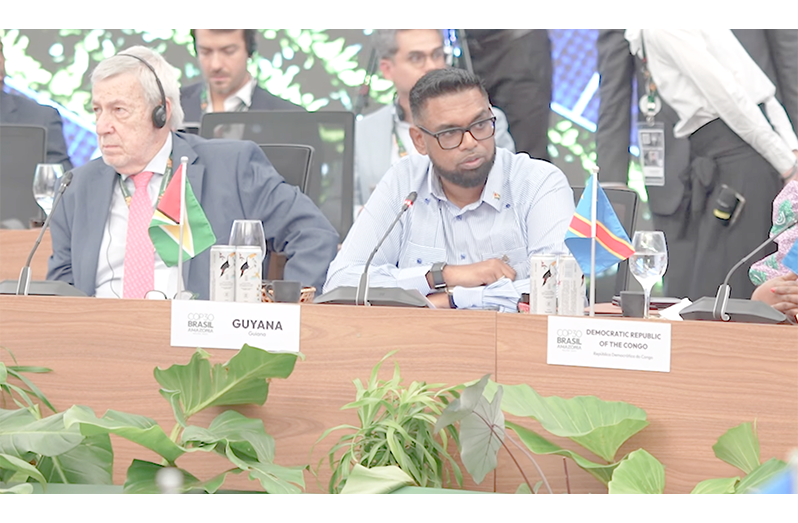— President Ali says most expensive, highest carbon footprint productions should be phased out first in just transition
REAFFIRMING the need to balance climate ambitions with economic realities, President Dr. Irfaan Ali has made a case for fossil fuels to remain integral to meet the current energy demands, particularly in developing nations, while the world simultaneously builds the financing mechanisms needed for sustainability.
Speaking at a roundtable discussion during the 30th United Nations Climate Change Conference (COP30) in Belém, Brazil on Friday, Dr. Ali noted that the global energy demand has risen by seven per cent over the past three years, with fossil fuels accounting for 60 per cent of that growth.
He stressed that while the world agrees on the need to transition away from fossil fuels, the real question is how to manage that fairly and realistically.

GUYANA’S BALANCED PATH
“The real question is, how, how do we manage this transition in a way that is just, rules-based and equitable… Simple calls for new producers to leave it in the ground are, in reality, a form of protectionism. It is a form of protectionism protecting those who are already wealthy as incumbents,” Dr. Ali asserted.
He suggested that a new transition must instead phase out the highest carbon footprints and most expensive productions and allow for the low-carbon and responsibly managed productions to meet the demand.
Though now an oil-producing nation, Guyana equally boasts a carbon sink, having maintained its standing forest for decades.
The country hopes to conserve its forest while pursuing its economic targets, as one of the largest per capita oil-producing nations, with targets set to increase daily production to more than one million barrels.
The country has been using its oil revenues to transform its landscape, making investments in health, education, infrastructure and social initiatives.
“We must have a viable plan. We must have the least efficient, phased out first and that is the way we will get to the targets that all of us want to so badly achieve,” President Ali said, noting that this will require global rules, carbon prices that reflect real costs, the removal of fossil fuel subsidies and competition based on carbon intensity and not legacy.
“If we can balance these two tracks, investing in increasing the energy of the future while managing fairly the decline of the energy sources of today, then the transition will be science-based, predictable and fair,” he said.
He reminded that fossil fuels still provide more than 80 per cent of the world’s energy and referenced the International Energy Agency’s (IEA) projection that even in a net-zero scenario, oil demand will decline only gradually — from 100 million barrels per day today to 72 million by 2030, and 24 million by 2050.
“None of this is easy and it does not fit neatly into the narratives peddled by some, but it is only by grafting these difficult challenges together that we will get there. We have to get there together. We have to bring all the stakeholders around this table. We cannot get there by extreme position. We have to get there through a balanced approach,” Dr. Ali said passionately, making a clarion call for greater collaboration among leaders.
President Ali urged leaders to move beyond slogans and work together on a science-based, equitable, and practical plan for achieving net zero.
“This COP gives us the chance to move beyond simplistic slogans that imply the transition is easy or that there is only one path forward. It allows us to focus on how to make it work, grounded in science, economic reality and fairness to succeed,” he added.



.jpg)



![front1 President Dr. Irfaan Ali participated in a roundtable discussion focused on energy transition at the United Nations Framework Convention on Climate Change
(UNFCCC) Conference of Parties (COP30) in Belém, Brazil. The session was chaired by the President of the Federative Republic of Brazil, Luiz Inácio Lula da
Silva. [ Office of the President Photo]](https://guyanachronicle.com/wp-content/uploads/elementor/thumbs/front1-1-redwdmk8xaytdpq3b81ya5esn29t3g6s4i7jdapc6m.png)




